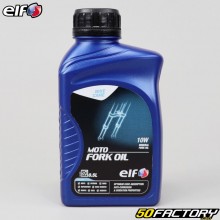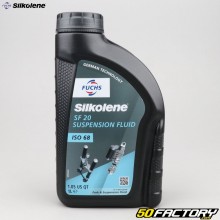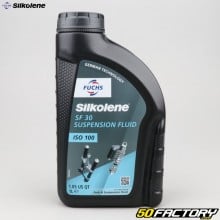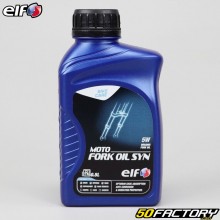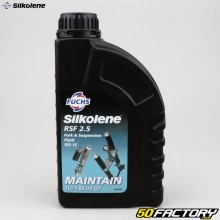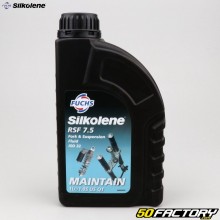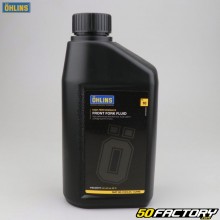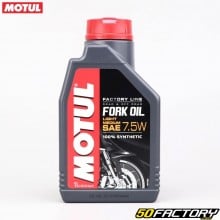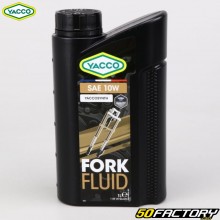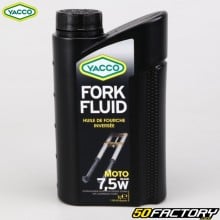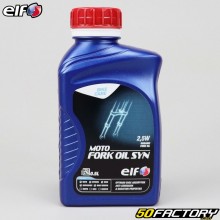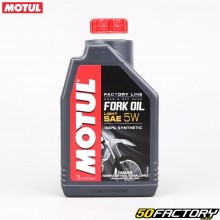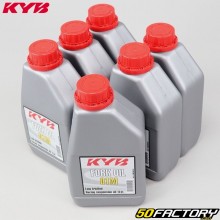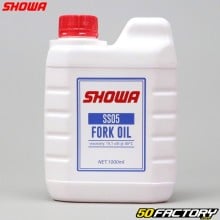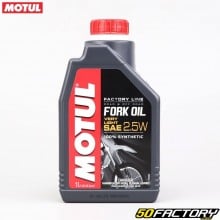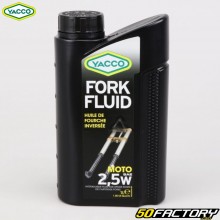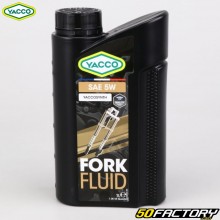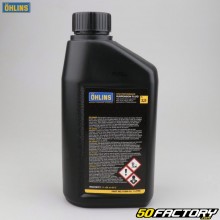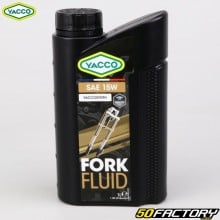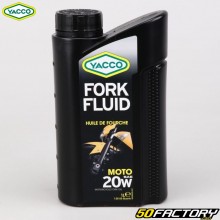 Fork and shock oil - pages 2
Fork and shock oil - pages 2
- IN STOCK10€30
- IN STOCK17€50
- IN STOCK18€40
- IN STOCK10€30
- IN STOCK18€40
- STOCK EXHAUSTED27€10
- IN STOCK18€20
- IN STOCK35€20
- STOCK EXHAUSTED27€10
- IN STOCK18€50
- IN STOCK18€50
- IN STOCK10€30
- IN STOCK26€90
- IN STOCK130€53
- STOCK EXHAUSTED39€50
- IN STOCK-28% 10,30 € 7€42
- IN STOCK29€10
- IN STOCK18€50
- IN STOCK18€50
- STOCK EXHAUSTED-28% 51,70 € 37€22
- IN STOCK18€50
- IN STOCK18€50
- IN STOCK124€50
Proper maintenance of your 50cc motorcycle is essential to ensure the longevity and performance of your vehicle. One of the often overlooked aspects of this maintenance is the choice and replacement of fork oil. However, the fork is a safety element, it is the one that connects the wheel to the ground. It is important to choose the right oil for your machine and your driving. Unlike engine oil which is subjected to high temperatures, fork oil is subjected to compression and expansion.
Understanding the Importance of 50cc Motorcycle Fork Oil
This specific type of lubricant plays a vital role in the proper functioning of your 50cc motorcycle. It is used in the motorcycle's suspension system, contributing to its comfort, stability and handling. This oil lubricates the various components of the fork, helping to reduce friction and effectively absorb shocks when you're riding, whether on smooth roads or on bumpier terrain. By absorbing shocks, the fork preserves the engine and frame and ensures rider comfort.
Using good quality fork oil can greatly affect the performance of your motorcycle. The right oil will give you a smoother, more comfortable ride, effectively absorbing road bumps and vibrations. In addition, it helps prevent premature wear of fork components, which contributes to the longevity of your vehicle. Fork oil therefore plays a dual role: it improves your riding experience while protecting your investment.
The different types of this product
It is essential to know the variety of oil you should choose. The viscosity of the lubricant is not the same depending on the equipment of your machine. The higher the index, the harder the fork will be.
Conventional fork lubricant
The type of oil to use varies depending on the type of fork on your motorcycle. For a conventional fork, the oil used will have a viscosity index of 10 to 15, or even more, depending on the displacement. So for large displacements, the index could be 30.
Inverted fork lubricant
For an inverted fork, the lubricant will have an SAE index of between 2.5 and 5. This type of fork is mainly fitted to off-road motorcycles. The oils used will be more fluid in order to have a good feeling of the terrain, which improves the performance of the fork in more intensive driving conditions.
Specific fluid Ipone
Brand Ipone offers high quality fork oils, particularly suitable for demanding motorcyclists. Ipone offers a grade 7, 100% synthetic formula specially designed for forks subject to high stress.
Motul specific product
Motul is another brand known for its quality lubricants. L'Motul fork oil offers exceptional performance and ensures the proper functioning of the fork. Medium 10W techno-synthesis lubricant is suitable for all types of inverted forks.
Kayaba Lubricant
Kayaba, manufacturer of forks and suspensions for motorcycles, has developed a high quality oil to maximize the performance of its products. This lubricant considerably reduces friction, increases the life of spinnaker seals and resists very well over time. This oil is compatible with Showa, WP and Öhlins forks.
Showa fork oil
Showa has also developed an oil for its suspensions. High performance, it improves the lifespan of spinnaker seals by reducing friction.
Öhlins Lubricant
Like Kayaba and Showa, Öhlins has designed specific high performance oils for its forks and shock absorbers.
Viscosity index
This specific lubricant is qualified par its viscosity whose grade index ranges from 2.5 to 30. The higher the index, the greater the viscosity.
Understanding Viscosity
Viscosity, often indicated par a number like 5W, 10W or 15W, is a measure of the oil's resistance to flow. A low viscosity oil (example: 5W) will be more fluid and will therefore move more easily in the fork, providing smoother behavior. A higher viscosity oil (example: 15W) will be thicker, providing stiffer suspension and better shock absorption.
Impact of viscosity on performance
You should know that the viscosity of your oil will have a direct impact on the performance of your motorcycle. Oil that is too thin can cause the suspension to be too soft, making the motorcycle unstable during heavy braking or repeated runs over obstacles. Conversely, oil that is too thick can make the suspension too stiff, affecting driving comfort.
How to select the right product?
Depending on the type of vehicle
As you have probably already understood, the choice of your oil depends largely on the type of your vehicle, and more particularly on the type of fork installed. Typically, modern motorcycles with cartridge forks will benefit from synthetic oil, while older motorcycles with conventional forks may use mineral or semi-synthetic oil.
Depending on driving conditions
The type of driving and road conditions should also be taken into account when choosing your fork oil. If you mainly drive on smooth roads and at low speeds, a low viscosity oil might be sufficient. If you often drive at high speeds, over difficult terrain, or compete, a higher viscosity oil will likely be more suitable.
Signs It's Time to Change This Specific Fluid
Visible signs
The signs that it is time to change your fork oil are usually visible and show par a loss of suspension performance. If your motorcycle seems more unstable, if the fork reacts differently, or if you experience a loss of comfort while riding, it's probably time to check the condition of your oil.
Impact on driving
Even slight suspension degradation can have a significant impact on handling. Indeed, poor suspension can reduce the handling and grip of the motorcycle, increase braking distances, and make driving uncomfortable. It is therefore crucial not to neglect this aspect of maintaining your motorcycle.
How to replace this product?
Preparation and necessary tools
Changing the fork oil requires certain tools, such as a torque wrench to unscrew the fork cap, a syringe to measure the oil, and containers to collect used oil. It is also recommended to consult your motorcycle's service manual for precise specifications and replacement steps.
Replacement steps
After preparing your tools and work area, unscrew the fork cap and remove the used oil. Then clean the inside of the fork to remove any remaining oil and dirt. Once the fork is cleaned, you can fill the fork with the new oil to the amount specified in the manual, then replace the cap.
Mistakes to avoid when replacing
One of the most common mistakes when replacing fork oil is not measuring the amount of oil correctly. Too little oil can cause the suspension to be too soft, while too much oil can cause the suspension to be too stiff. It is therefore crucial to carefully measure the quantity of oil needed using a syringe and to follow the manufacturer's instructions.
You will take advantage of this drain to replace the dust covers and spinnaker seals of your fork.
Mistakes to avoid when choosing and replacing
We've already mentioned the importance of oil viscosity, but it's worth pointing out that choosing the wrong viscosity is a common mistake that can impact the performance and ride comfort of your motorcycle. It is therefore important to understand what viscosity means and to choose the right viscosity based on the type of fork and riding conditions.
Another common mistake is neglecting fork oil replacement. Like any oil, fork oil degrades with time and use, and requires regular replacement to maintain its properties. Don't wait until you experience suspension problems to replace your fork oil, and be sure to follow the manufacturer's recommendations for replacement intervals. As a general rule, the oil should be changed every two years or 30 km.
The range offered par 50 Factory
50 Factory offers a wide range of fork oils for all makes and models of two-wheelers. Whether you are looking for an oil for a conventional fork or an inverted fork, for normal or intensive use, you will certainly find the product suited to your needs on our online platform. We offer oils from different manufacturers, including Gencod, Ipone, Kayaba, Motorex, Motul, Showa, to offer you the best possible choice.
Benefits and features of 50 products Factory
All oils offered par 50 Factory are rigorously selected for their quality and performance. We are committed to offering high quality, durable and high performance products. In addition, we do everything to make your choice and purchase easier, with an easy-to-use online platform, detailed descriptions of each product, and a customer service team available to answer all your questions.
Remember to consult the other categories in the "oils and maintenance products" section to find all your parts: grease, chain grease and oil, gearbox oil, fork and shock absorber oil, transmission oil, air filter oil, 2T engine oil, 4T engine oil, coolant, brake fluid, lubricant, various maintenance products.

































